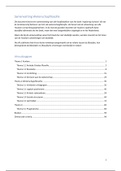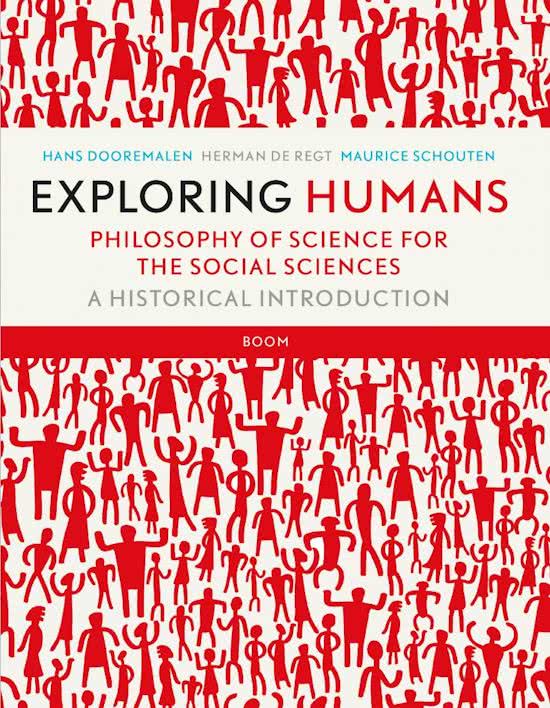Samenvatting Wetenschapfilosofie
Dit document bevat een samenvatting van alle hoofdstukken van het boek ‘exploring humans’ die tot
de tentamenstof behoren van het vak wetenschapfilosofie. Het bevat ook de uitwerking van alle
Youlearn verwerkingsopdrachten. In de meeste gevallen bevatten de Youlearn opdracht bijna
dezelfde informatie als het boek, maar dan wat toegankelijker uitgelegd en in het Nederlands.
Zaken die bij de samenvatting vanuit het boek dus niet duidelijk worden, worden meestal na het lezen
van de Youlearn uitwerkingen wel duidelijk.
Na elk subthema heb ik een korte mindmap aangemaakt om de relatie tussen de filosofen, hun
belangrijkste denkbeelden en filosofische stromingen inzichtelijk te maken.
Inhoudsopgave
Thema 1 Kenleer...................................................................................................................................... 2
Thema 1.1 Antieke Griekse filosofie.................................................................................................... 2
Thema 1.2 Revolutie............................................................................................................................ 8
Thema 1.3 Verlichting ....................................................................................................................... 15
Thema 1.4 Grenzen aan de wetenschap ........................................................................................... 23
Thema 2 Wetenschapsfilosofie ............................................................................................................. 35
Thema 2.1 Verklaren of begrijpen ..................................................................................................... 35
Thema 2.2 Logisch positivisme .......................................................................................................... 45
Thema 2.3 Kritisch rationalisme ........................................................................................................ 54
Thema 2.4 Sociale structuren ............................................................................................................ 64
Thema 2.5 Het failliet ........................................................................................................................ 74
Thema 3 ................................................................................................................................................. 82
Thema 3.1 Pragmatisme.................................................................................................................... 83
Boeken ................................................................................................................................................... 93
Demarcatie criteria ................................................................................................................................ 94
1
,Thema 1 Kenleer
Thema 1.1 Antieke Griekse filosofie
Boek Introduction en hoofdstuk 1
Introduction
• With all the advances in technology it seems that we live in an age of certainty. However, much
scientific research in grounded on beliefs that are taken for true without proof.
o Think of beliefs that we are alone in the universe, our minds will not survive death,
evolution is responsible for life etc.
• Perhaps truth and certainty are beyond human capacities as exploring is a human activity and
human are limited beings as our rational and sensory capacities are far from perfect. So, we are
prone to make mistakes.
o For that reason, postmodernist and relativists state there is no proof whatsoever in
science. Scientists are held captive by the prejudices of the society in which they are born
and raised.
Part 1 Philosophy of knowledge
Chapter 1 Out of the Cave: Rationalism and Empiricism in Antiquity
• Socrates (470-399 B.C.) claimed that not knowing was his only certainty.
o He asked people questions to get at their presuppositions and have them rethink their
opinions. For that he eventually received the death penalty.
o He wondered what knowledge is and kicked of the long history of the philosophy of
knowledge, or epistemology raising a number of questions:
▪ How can we justify knowledge?
▪ What is the ultimate source of knowledge?
▪ What is the method by which we gain knowledge?
• These questions can be answered via 2 broad and competing approaches:
o Rationalism, being the view that knowledge results from the proper use of human
reasoning abilities (ratio, intellect).
▪ Our capacity to think generates ideas and concepts which we cannot arrive at by
using our sensory capacities alone.
▪ This position is based on the work of Plato.
o Empiricism, being the view that knowledge is generated by our sensory capacities.
▪ As the senses are reliable indicators of what reality is like.
▪ This position is based on the work of (Plato’s pupil) Aristotle.
• Plato’s rationalism
o Plato (427-347 B.C.) was a famous pupil of Socrates.
o He was born in Athens in an upper-class family. He later left Athens and traveled and
returned to Athens to begin his own school, the academia. He then went to Sicily to tutor
Dionysius II, who placed him under house arrest. After his release he returned to his
school and was an active teacher until his death.
2
, o Fierce debates are ongoing in the area of ontology with the central issue being the
difference between being and becoming:
▪ Heraclites (the obscure) was convinced that change is at the heart of existence.
We can only truthfully claim that nothing is; everything becomes (panta rei) as
things are continuously changing. Due to the ever-changing nature of
appearances, most people are not able to attain knowledge. Only those few who
are capable of grasping the hidden and fundamental law (logos) behind
appearances can arrive at knowledge.
• Protagoras (490-420 B.C.) states that ‘individual things are for me such
as they appear to me, and for you as they appear to you’.
• Plato rejects the idea of knowledge being perception, because that
would mean that genuine knowledge does not exist. He also believes
that for knowledge we cannot appeal to the evidence of observation,
given the constant changes to reality.
▪ Parmenides opposed this view as he believed that underlying all the change and
movement that we pick up with our senses is a permanent and unchanging
reality. So, everything is; nothing becomes. Thus, as our senses are misleading
guides to reality, we must rely on reason to discover reality.
• In Plato’s view being is perfect, implying that it has to be unchangeable
and therefore he goes along with Parmenides. True knowledge requires
the apprehension of the eternal Forms, being the ultimate realities that
ground true knowledge. This in addition to the world that we perceive
with our senses.
o Empirical investigation is inadequate because that will bring us
into contact with a reality that is constantly changing
(Heraclites).
• Knowledge about this transcendental reality can be gained though our
capacity for reasoning. This makes Plato a rationalist.
• Plato is also a nativist, believing that humans possess innate ideas at
birth, meaning that we don’t have to rely on our senses for knowledge.
o Plato even believed we are born possessing all knowledge. We
have lost it, but are able to remember it all, if we use our reason
correctly. To learn, therefore is to remember.
o Plato also has a theory on reincarnation, stating that immortal
souls belong to the World of Forms possessing all knowledge.
• Aristotle’s empiricism
o Aristotle (384-322 B.C.) was a famous pupil of Plato.
o He was born in Macedonia and moved to Athens to study at Plato’s academia. He later
founded his own academy in Turkey. After his wife got killed in war, he moved to Lesbos
and devotes himself to biological studies. At request he became teacher of Alexander the
Great and later returned to Athens to begin his own school of philosophy (lyceum).
o His work got lost but was found again and is mostly used in the Islamic world, whereas
his ideas where neglected in the Christian world until the 13th century.
o Empiricism comes from the Greek word empeiria or experience.
o Empiricists claim that our senses bring us into immediate contact with the world.
Therefore, the experiences we have when we explore the world must constitute the
foundation of knowledge.
3
, o Aristotle was an earth-bound empiricist, meaning that for scientific progress we must
leave abstract theorizing and turn to the empirical facts of nature.
o He argues that theories have to be in accordance with appearances, including not only
observations but also common beliefs, shared by the many and the wise.
o Aristotle believes there is only one world and not 2 like Plato suggested (the
supersensory world of the Forms and the natural world in which we live).
o All knowledge comes ultimately from observing nature, so he doesn’t believe in inborn
knowledge. We are born with no knowledge at all.
o The peripatetic axiom of Aristotle is “nothing is in the intellect which was not first found
in the senses”.
o The empiricist doctrine that all knowledge derived from sensory information has
important implications for scientific methodology as set out in Aristotles 6 logical
treatises:
▪ We only have knowledge of a thing when we know its cause. A causal
explanation involves reasoning from basic theoretical principles to particular
cases. Therefore, we must construct a syllogism, a deductive argument:
▪ (a) all human beings are mortal
(b) Socrates is a human being => hence, Socrates is mortal
▪ (a) and (b) are the premises of the syllogism and (c) the conclusion. We thus
move from a true law to a particular case.
o Induction means moving from the concrete to the abstract. It involves an advance from
observation of particular phenomena to universal laws. Via induction we thus acquire
knowledge of the primary premises being the premises of the syllogism.
▪ However, we can never be sure that something is correct, as we might still
observe a case that falsifies it.
o Therefore, induction can never guarantee universal validity of scientific principles, but is
just the first step. The next step is to use intuition by a special and infallible intellectual
capacity called nous. So, intuitive induction by the mind, can guarantee the truth of
empirically acquired correlations according to Aristotle.
o Classifying Aristotle as an empiricist is however controversial:
▪ Induction is not exclusively observational as nous is needed in addition to the
sensory powers to obtain knowledge.
o Aristotle reasons that scientific demonstrations must be causative. Aristotle identifies
four causes:
▪ The formal cause. The Apollo shape of a statue.
▪ The material cause. The marble the statue is made of.
▪ The efficient cause. The primary source of change, being the sculptor.
▪ The final cause. The reason why something is done, the aesthetics of the statue.
o However, the concept of causality that arose during the Scientific Revolution only takes
notion of the efficient cause as a real and scientifically interesting cause.
o This also means that Aristotle is NOT a radical empiricist, relying exclusively on the
output of the senses as different types of causes cannot be grasped by using sense alone
and reasoning is required.
o Though Aristotle argues that theories must be based on observed facts, his theories are
mostly based on limited and superficial datasets led by unquestioned assumptions.
4






